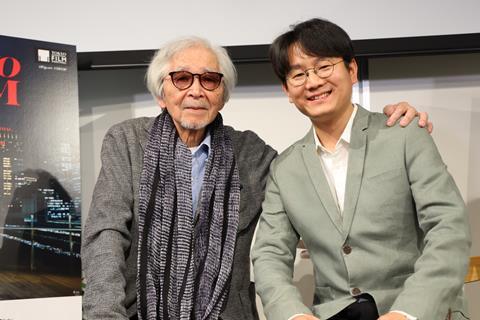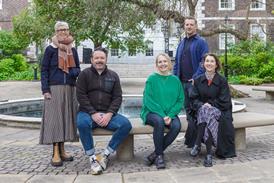
Veteran filmmaker Yoji Yamada has recalled his relationship with iconic Japanese director Akira Kurosawa during an on-stage conversation at Tokyo International Film Festival.
The 92-year-old director, best known for his Toro-san series of films and The Twilight Samurai, took part in a TIFF Lounge session on Monday (October 30) with Chinese director Gu Xiaogang.
Gu has been honoured with the Kurosawa Akira Award at this year’s TIFF, which was revived last year after an absence of 14 years, is presented to filmmakers who have “made waves in cinema” and are expected to help guide the industry’s future.
The Chinese director of Dwelling In The Fuchun Mountains described Yamada as being “like a kung fu master” when it came to his cinematic imagination.
“I used to feel the same way about Akira Kurosawa, who I was close with,” said Yamada. “When he really got into it, you could see his imagination expanding. He used to say that when you see a film on the big screen, it would emit a certain feeling, almost like a smell, that reflected the director’s personality.”
Yamada added that Gu receiving the award named after Kurosawa was especially appropriate because “despite (Gu’s) films being very different from Kurosawa’s, I think he would have loved them”.
Gu’s second film Dwelling By The West Lake, received its world premiere in Competition at this year’s TIFF. The story revolves around a poor son and his single mother in rural China whose lives are turned upside down by a pyramid scheme.
“I was so surprised to see such a wonderful film,” said Yamada. “Watching it kind of felt like listening to the music of Mozart.”
Gu, visibly overwhelmed in the company of the veteran director, admitted the two things that made him most nervous about attending this year’s TIFF were premiering his new film and appearing on stage with Yamada.
It marked the second meeting between Gu and Yamada, who previously spoke at Shanghai International Film Festival in June, where Yamada lavished praise on Dwelling In The Fuchun Mountains.
“I was so happy to have met him in Shanghai and little did I think we would be meeting again like this here in Tokyo,” said Gu. “I’m still a young director, but this has really motivated me.”
As they begin their talk, Yamada expressed surprise at the tonal and stylistic differences between Dwelling In The Fuchun Mountains and Dwelling By The West Lake.
Part of the difference, Gu explained, came down to production specifics: the former was a “poetic” self-funded project starring Gu’s friends and relatives that took two years to produce, while the new film had a professional cast and crew.
“You’re lucky it starred your relatives,” joked Yamada of the former film. “Actors never would’ve stood for a two-year shoot.”
Yamada also noted with a laugh that in the two years it took to make Fuchun Mountains, he could have made four or five Tora-san features. There were around two Tora-san films released a year between 1969 and 1989.
Gu explained another reason came from his differing motivations behind making the two films.
“For the first film, I didn’t understand the language of cinema yet, so it was a process of discovery,” he said. “I wanted to forget about the audience, to peek into the essence of what filmmaking is. Making the second film, I wanted to really think about the audience, because the film involves pyramid schemes. I wanted even those who’ve never been touched by such schemes to be pulled in.”
Returning to Dwelling In The Fuchun Mountains, Yamada expressed his appreciation for the film’s long takes and lack of close-ups, describing it as akin to the works of Kenji Mizoguchi. Yamada was especially taken by single shot that lasts about 13 minutes – something, he noted, simply could not have been done in the pre-digital days due to the capacity of a film camera.
As the talk came to a close, Yamada reflected on the purpose of cinema and the arts in general: to create works that “support and reinvigorate” hard-working people.
“I’d be happy if a character like Tora-san has had that kind of an impact in China,” said Yamada. “And it would be interesting if Gu made a film like that, even five or 10 years from now.”
Gu likened the suggestion to getting a homework assignment from a favourite teacher, telling Yamada he would try his best.























No comments yet